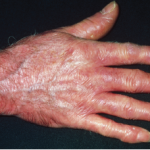With more than 450 sessions, the 2018 ACR/ARHP Annual Meeting, is your gateway to global rheumatology education. Here is a preview of a few sessions attendees can look forward to…


With more than 450 sessions, the 2018 ACR/ARHP Annual Meeting, is your gateway to global rheumatology education. Here is a preview of a few sessions attendees can look forward to…

Elizabeth Hofheinz, MPH, MEd |
“You have systemic sclerosis,” says the physician. Other somber words patients may hear the day they learn their diagnosis include, “rare, chronic, no treatment.” But a ray of hope could soon enter those exam rooms thanks to research conducted by a team from the UK. Rizgar A. Mageed, PhD, FRCP, FRCPath, is professor of experimental…

Rheumatologists and orthopedic surgeons must frequently collaborate to provide optimal patient care. Sometimes, they may even work at the same practice and form a care team for easy collaboration. Still, patient management from both specialties can be challenging, and specialists from both sides can learn from each other. How Crossover Starts Rheumatologists and orthopedic surgeons…

For patients with refractory Takayasu arteritis (TAK), glucocorticoids (GCs) are often provided as the initial therapy for treatment. However, GCs are often associated with adverse effects for long-term use; relapse also occurs frequently during GC tapering.1 TAK involves interleukin (IL) 6. Tocilizumab—a recombinant, humanized, anti-IL-6 receptor (IL-6R) monoclonal antibody—was first reported by Nishimoto et al….

Upadacitinib proved safe and effective in RA patients who had inadequate responses to conventional disease-modifying anti-rheumatic drugs…

Does cognitive dysfunction in SLE patients result from persistent inflammation characterized by ongoing disease activity? Recent research examining this question found no inflammatory mechanism associated with cognitive dysfunction in this patient population, underscoring previous research findings…

CHICAGO—As good an option as hydroxychloroquine (HCQ) is for many patients with rheumatic diseases, such as rheumatoid arthritis and especially lupus, safety must be an important consideration, an expert said at this April’s ACR State-of-the-Art Clinical Symposium. The use of the antimalarial has become a controversial subject, with clinicians trying to balance the drug’s disease-modifying…

How do you ask a new patient about sex and gender—or know which pronoun to use? Keep the conversation straightforward and respectful to put everyone at ease, says Morgan Orndorff, a transgender man who works as an administrator at a major academic medical center. “Everyone is a little different in terms of their sensitivity level”…
Marilynn Larkin |
NEW YORK (Reuters Health)—Risk of myocardial infarction (MI) is increased in patients with spondyloarthritis (SpA) who use the nonsteroidal anti-inflammatory drug (NSAID) diclofenac, but not in those who take naproxen, researchers say. Maureen Dubreuil, MD, MSc, of Boston University School of Medicine, and colleagues analyzed 20 years of medical records from the U.K.’s Health Improvement…

Larry Beresford |
In the complex web of interactions between systemic inflammatory response, rheumatic disease and disease-modifying anti-rheumatic drugs (DMARDs), what is the potential for using rheumatologic therapies to treat other medical conditions linked to inflammation? Some medical researchers have looked at cardiac conditions, and others have examined the overlap with Alzheimer’s disease and other dementias. Positive effects…